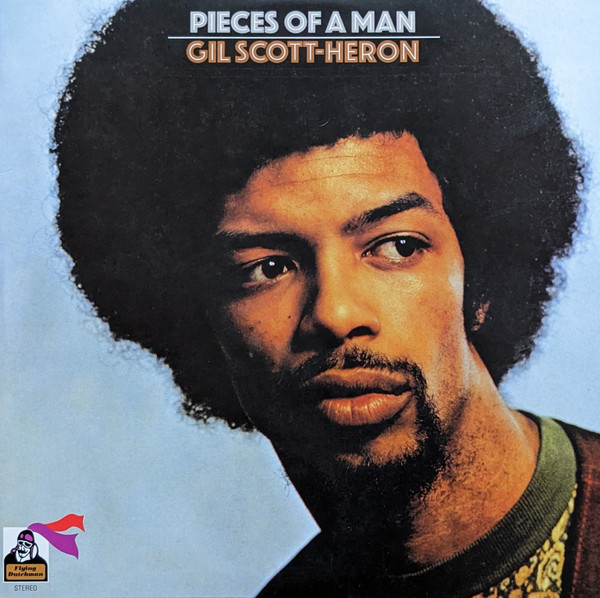Gil Scott-Heron’s ‘Pieces Of A Man’ Reissued On AAA Vinyl
BGP’s 45 rpm edition of this essential album is a stunning revelation
Gil Scott-Heron’s Pieces Of A Man shouldn’t be relevant anymore. That is, it shouldn’t have to be relevant anymore, but it unfortunately still is. Since its 1971 release, its themes of racism, poverty, addiction, and the slight hope for a better future have retained a visceral urgency; partly because of Scott-Heron’s brilliant lyrics and powerful performances, and also because over 50 years later, the issues he wrote about continually worsen.
Released on producer Bob Thiele’s Flying Dutchman label, Pieces Of A Man was Scott-Heron’s first proper studio album following the “live” (in studio) poetry record Small Talk At 125th And Lenox. While he’d published a book before that, Small Talk demonstrated the sheer power of his words in recorded form, his sociopolitical commentary scathing (the record’s most famous piece, “Whitey On The Moon,” critically asks why taxpayer money went towards the moon landing while Black people remained in mass poverty) if sometimes flawed (“The Subject Was F****ts” obviously hasn’t aged well, though who knows what Scott-Heron would think now if he were still alive). Pieces Of A Man finally set Scott-Heron’s words to soul jazz backing provided by a world-class lineup of bassist Ron Carter, drummer Bernard Purdie, flautist Hubert Laws, conductor Johnny Pate, and perhaps most importantly, Scott-Heron’s primary collaborator Brian Jackson who plays both acoustic and electric piano (which sometimes sounds like a vibraphone).
The album’s opening track “The Revolution Will Not Be Televised,” often considered a significant influence on rap, gets the most attention as a harsh, enduring commentary about the superficiality of commercial culture. The exact references are very specific to 1971, but the sentiment isn’t: “And women will not care if Dick finally got down with Jane on Search For Tomorrow because Black people will be in the street looking for a brighter day.” I’d argue that part of its lasting power is in the dated references surrounding a message that’s still as relevant as ever, in how it reflects the lack of progress or change in the last 52 years.
Still, to focus solely on “The Revolution Will Not Be Televised” is unfair to the rest of the album. “Home Is Where The Hatred Is” is a stark assessment of addiction and poverty, while “Lady Day And John Coltrane” is about the escapist power of music, particularly how necessary that escapism was and still is. There’s some lighter material, though; “Save The Children” expresses concern for future generations and how “soon it will be their turns to try and save the world,” “When You Are Who You Are” encourages individuality, and “I Think I’ll Call It Morning” shows a glimmer of optimism. Some dismiss these lighter songs as unnecessary fluff, though I think they’re important to balancing out the album’s overall worldview. That’s all just the first side. The second side is generally heavier, with Scott-Heron’s takes on American society sounding more defeated than overtly critical and the music more somber. He wasn’t much of a singer in a technical sense, but he communicated emotion better than almost anyone and of course the superb backing band assembled by producer Thiele at Scott-Heron’s joking request certainly helps. Enough of me blabbering on, though, there’s no reason to not listen to this record that so effectively gets its message across whether you’re ready to hear and accept it or not.
In October 2022, UK-based reissue label BGP Records (a division of Ace) released a belated 50th anniversary edition as a 45rpm 2LP set. The original master tapes were shipped from the US to London—itself a miracle—for all-analog cutting by Frank Merritt at The Carvery. If you think you’ve heard this album sound good before, you haven’t. Previous issues of Pieces Of A Man, ranging from the original Flying Dutchman LP (which Tracking Angle editor Michael Fremer digitized for me) to the decent enough 2014 CD remaster, sounded buried under a layer of midbass thickness with Gil’s voice also sounding boomy. This new AAA reissue is a stunning revelation. Soundstage transparency, instrumental separation, texture, and overall presence is fully unveiled for the first time, with excellent three-dimensionality and quiet backgrounds. Instead of sounding like an announcer booming from a public loudspeaker, Gil sounds as if he’s singing to you. The mix has some reverb on his voice, but it’s nothing like what must’ve been added or emphasized on the original. Bernard Purdie’s hi-hats sound natural and airy compared to the original’s trashiness, his snare richer and less boxy. Brian Jackson’s acoustic and electric pianos are finally clear, the subtlety in Burt Jones’ guitar noticeable, and most impressively, Ron Carter’s bass is fully extended, muscular, and clear without clouding up the other instruments. Despite all this fresh clarity, the overall image is cohesive in a way the original isn’t; you can hear the space occupied by the full band playing together, rather than Gil Scott-Heron and then everyone else. Without hesitation, I can say that this 50th anniversary reissue renders the original obsolete as anything other than a historical artifact. The original was the best version until now, but this new 45rpm reissue obliterates both that and the 2014 remaster.
If that sounds hyperbolic, it really isn’t. Pieces Of A Man will never be the absolute best sounding recording ever, but we now know it was actually a very good recording all along. You wouldn’t know that from the previous editions. GZ Media pressed this reissue on 180g vinyl; save for a few pops, it’s generally quiet and decently flat. The packaging only consists of an overly tight direct-to-board gatefold jacket with the original artwork, which is mildly disappointing for a 50th anniversary reissue of such a historically important album. The artwork scans are merely passable and new liner notes would’ve been nice, but I can’t complain too much since the sound is so good and the approximately $40 price is reasonable for the quality. Pieces Of A Man belongs in every record collection, and this reissue is the copy to own. But I’ll stop going on about it—just get a copy and listen.










































.png)








